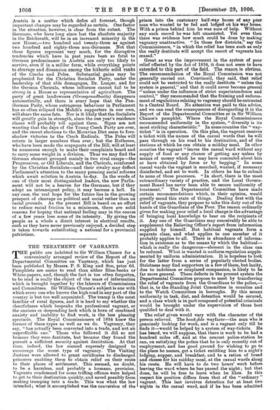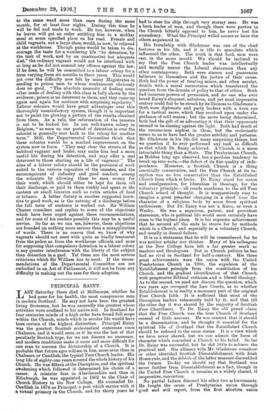THE TREATMENT OF VAGRANTS.
T"public are indebted to Sir William 'Chance for a • conveniently arranged review of the Report of the Departmental Committee on Vagrancy, which has just been published by Messrs. P. S. King and Son, price 6d. PaMphlets are easier to read. than either Blue-books or White-papers, and, though the fact is too often forgotten, to be read is really the object of the masa of informatiett which is brought together by the labours of Commissions and Committees. Sir William Chance's subject is one with which every one who knows the high road in any part of the country is but too Well acquainted. The tratnp is the most fathiliar of rural figures, and it is hard to say whether the cheerfulness which bespeaks the professional vagrant, ot the anxious or desponding look which is born of combined anxiety and inability to find work, is the less pleasing spectacle. The Royal Commissioners of 1834 knew the former of these types as well as we do. Vagrancy, they say, "has actually been converted into a, trade, and not an unprofitable one. Those who follewed it did do net because they were destitute, but becanse they found the pursuit a sufficient security against destitution. At that time, indeed, the law seethed expressly designed to encourage the worst type Of vagranty. The Visiting Justices were allowed to grant certificates to discharged prisoners enabling them to obtain relief on theit route to their places of settlement. This seemed, no doubt, to be a harmless, and probably a humane, provision. Vagrants condemned for some trifling offence Were helped to get to their destinatien quickly, and saved possibly from making tramping inte a trade. This was what the law intended; What it accomplished *as the conversion of the prison into the custoinery half-way house of any peat man who wanted to be fed and lodged oti his Way home. With a prison behind him he was sure of help. Without any such record he was left unaisisted. Yet even then there was evidence how much could be done by making vagrancy unattractive. "In those feet districts,' say the Commissioners, "in which the relief has been such as only the really destitute will accept the resort of vagrants has ceased."
Great as was the improvement in the sydteth of poor relief effected by the Act of 1834, it does not seem to have extended to this part of the field. The reason is obvious. The recommendation of the Royal Commission was not generally carried out. Convinced, they said, that relief could not be restricted to the really destitute " unleis the system is general," and that it could never become general "unless under the influence of strict superintendence and control," they recommended that the framing and enforce- ment of regulations relating to vagrancy should be entrusted to a Central Board. No attention was paid to this advice, and we can read the consequences of disregarding it in the Report of the Departmental Committee or in Sir William Chance's pamphlet, Where the Royal Commissioners recommended uniformity in the system, "diversity is its most striking characteristic." In some counties the " way- ticket " is in operation. On this plan, the vagrant receives, a ticket with the names of the casual wards that he will pass through on his road to his destination, and of the stations at which he can obtain a midday meal. In other counties the vagrant "leaves the casual ward without any supply of food or any chance of getting any unless by means of money which he may have concealed about him or have obtained by force or by begging." In some casual wards the vagrant is searched, washed, if necessary disinfected, and set to work. In others he has to submit to none of these processes. "In short, there is the most extraordinary variety of practice, and the Local Govern- ment Board has never been able to secure uniformity of treatment." The Departmental Committee have made certain recommendations which, in their opinion, would greatly mend this state of things. Dealing first with the relief of vagrants, they propose to take this duty out of the hands of the Guardians of the Poor. The reason ordinarily- given for making poor relief a local charge is the advantage of bringing local knowledge to bear on the recipients of it. Any one of the Guardians may conceivably be able to supplement the Relieving Officer's report from information supplied by himself. But habitual vagrants form a separate class, and what applies to one member of it probably applies to all. There is abundance of informa- tion in existence as to the means by which the habitual— which is really the dangerous—element in the class can be reduced. -What is wanted is uniform regulation supple- mented by uniform administration. It is hopeless to look for the latter from a series of popularly elected bodies. Strictness may find, supporters in a few of them, but laxity, due to indolence or misplaced compassion, is likely to be far more general. These defects in the present system the Departmental Committee propose to meet by transferring the relief of vagrants from the Guardians to the police,— that is, to the Standing Joint Committee in counties and to the Watch Committees in boroughs. By this means uniformity in task, diet, and detention Would be secured, and a class which is in part composed of potential criminals would be brought under the supervision of those best qualified to deal with it.
The relief given Would vary with the character of the person relieved. The bond-fide wayfarer—the man who it genuinely looking for work, and is a vagrant only till he finds it—would be helped by tt. system of way-tickets. He has heard, we will suppose, that there is work to be had a hundred miles off, and at the nearest police-station he can, on satisfying the police that he is only recently out of employment, and has good ground for wishing to go to the plate he names, get a, ticket entitling him to a night's lodging, supper, and. breakfast, and to a ration of bread and cheese for his midday meal, at the casual wards along his route. He will have to do two hours' work before leaving the ward where be has passed the night ; but that done, he will be free to leave when he likes. In this respect his position differs from that of the " ordinary " vagrant. This last involves detention for at least two nights in the casual ward, and if he has been admitted to the same ward more than once during the same month, for at least four nights. During this time he will be fed. and made to work. He too, however, when he leaves Will get an order entitling him to a midday meal at some specified place on his road. Female and. child vagrants, not a large class, would, as now, be relieved at the workhouse. Though pains would be taken to dis- courage the taste for a wandering life "by detention, by the task of work, and by an unattractive but adeqUate diet," the ordinary vagrant would. not be interfered with so long as he did not commit any offence against the law. If he does, he will be committed to a labour colony for a term varying from six months to three years. This would get over the difficulty now felt by many Magistrates in sending to prison men to whom confinement obviously does no good. "The absolute necessity of finding some other mode of dealing with this class is fully shown by the evidence; prison is no deterrent to them, and they came up again and again for sentence with surprising regularity. Labour colonies would have great advantages over this thoroughly unsatisfactory system, though it is important not to paint too glowing a picture of the results obtained from them. As a rule, the reformation of the inmates is not to be looked. for. In one well-known colony, in Belgium. "as soon as one period of detention is over the colonist is generally sent back to the colony for another term." Still. the Departmental Committee think that these colonies would be a marked improvement on the system now in force. "They may clear the streets of the habitual vagrant and loafer, may make him lead a more useful life during his detention, and. may offer a real deterrent to those starting on a life of vagrancy." The aims of a labour colony should. be the provision of work suited to the various capacities of the inmates, and the encouragement of industry and good conduct among the colonists by allowing them to earn money for their work, which should either be kept for them till their discharge, or paid to them weekly and spent at the canteen on small luxuries such as extra articles of food or tobacco. A better dietary is another suggested incen- tive to good work, as is the earning of a discharge before the full term of sentence is worked out. Sir William Chance considers and replies to some of the objections which have been urged against these recommendations, and for some of his readers possibly this may be a useful service. So far as we can see, however, these objections are founded on nothing more serious than a misapplication of words. There is no reason that we know of why vagrants should not meet with quite as kindly treatment from the police as from the workhouse officials, and. none for supposing that compulsory detention in a labour colony is any greater interference with the liberty of the subject than detention in a gaol. Yet these are the most serious criticisms which Sir William has to meet. If the recom- mendations of the Departmental Committee are not embodied. in an Act of Parliament, it will not be from any difficulty in making out the case for their adoption.



































 Previous page
Previous page